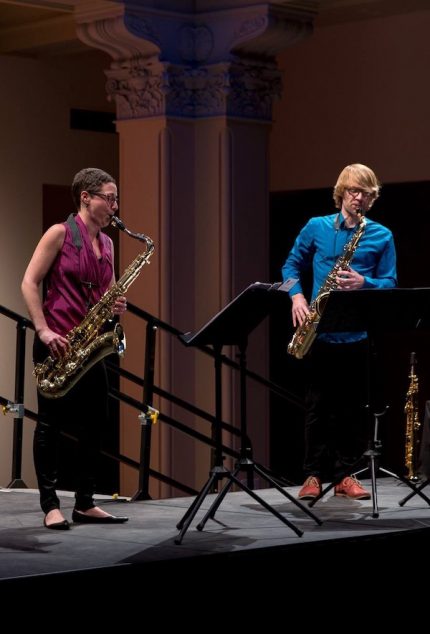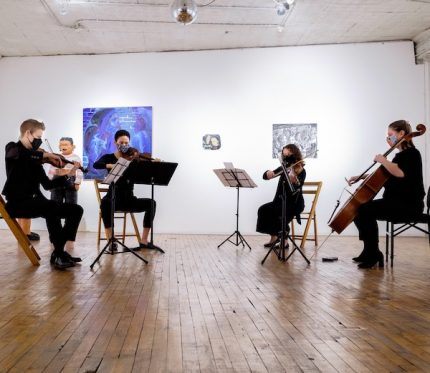Assad and Choi works stand out in Ear Taxi’s day at DePaul Museum

Ear Taxi Festival 2021, a presentation of New Music Chicago, is a city-wide celebration of contemporary and experimental music. Now in its second iteration after launching in 2016, this year’s festival centers on the theme “HEAR CHICAGO,” featuring music written primarily by Chicago-based composers with the goal to “[elevate] Chicago as an internationally recognized center for extraordinary musical and cultural innovation.” Boasting a roster of nearly 600 artists across its Spotlight and Mainstage concerts, Ear Taxi 2021 is bound to have something for every taste.
I chose to attend a block of three 45-minute concerts on Friday at the DePaul Art Museum. This space, seating about two dozen audience members, provided an appropriately intimate setting for the soloists and chamber groups, and the faint rumble of the L trains passing by the window often complemented the percussiveness of some of the music.
The first concert featured violinist Sarah Plum and began with a piece for solo violin by Tonia Ko called Moves and Remains (2018). Written for violin scordatura, the piece featured an array of fragmentary eruptions, high harmonics, and double stops, bookended by extended pizzicato passages. Second on the program was Flowering Dandelion (2020) by Kyong Mee Choi for solo violin and electronics. The electronic recording, played on a Bluetooth speaker, provided an otherworldly backdrop of tinkling bells and other sounds, around which the violin weaved in and out. The expanded color palette and greater differentiation of greater textures made this the most compelling piece on their program.
A bleak and intense duet with cellist Nick Photinos called Absconditus (2011) by Sidney Corbett followed. Plum concluded the program with Olive Cotton (2009) by Osnat Netzer—another parade of extended violin techniques. A noted advocate of new music, Sarah Plum played this challenging program with technical mastery and commitment even if one would not die to hear these pieces again any time soon. Still, they certainly lived up to Ear Taxi Festival curatorial director Michael Lewanski’s claim that “Chicago’s music is irregular, improvisatory, incomplete, unlikely.”
After a quick reset, Ogni Suono took the floor. The duo, made up of saxophonists Noa Even and Phil Pierick, presented two pieces off their 2018 album SaxoVoce, which explores ways of synthesizing the saxophone and the human voice. The first work was a so-called “mini-opera” by David Reminick called Walking After Midnight (2017). The piece begins by the duo alternating between playing and singing notes of a disjointed, syncopated melody. After this arresting exposition, the players alternate between the roles of singer and accompanist, telling the story of a boy who befriends a benevolent ghost while sleepwalking. The pair displayed pleasant singing voices, especially Phil Pierick, who had some fiendishly high lines. However, there were moments when the singing could have been more assured to make more sense of the wandering melodies and to match their precise and confident saxophone playing.
Written for two soprano saxophones and wordless singing, Chris Fisher-Lochhead’s Chroma was an amorphous contemplation on color. Emily Koh’s microtonal /tele/path (2021) for baritone and tenor saxophone, was devoid of singing but too similar in its amorphousness to Chroma to make much of an impact except for the loud mouth pops at the end.

After a lunch break, 5th Wave Collective took the stage. Dedicated to “presenting works by womxn and gender-nonconforming composers,” the ensemble is composed of violinists Carmen Abelson and Alexandra Hill, violist Roslyn Green, and cellist Allie Chambers with 5th Wave artistic director Ashley Ertz, on oboe and English horn.
They began with Bach-Shards (2002) by Shulamit Ran, which is exactly as the name suggests. Written as an imagined prelude to Contrapunctus X of The Art of the Fugue, the piece was a refreshing break from atonality and nebulous soundscapes. Next was a piece by Ear Taxi founder Augusta Read Thomas called Pilgrim Soul (2011) for English horn and two violins. Taking its name from a line of William Butler Yeats’s poem “When you are old,” Pilgrim Soul features three independent but interconnected voices, the wistful strains of the English horn at the center. Ertz played with moving lyricism, while the violin playing could have been more precise in their intonation. Osnat Netzer had another outing with the second movement of her String Quartet No. 2, recapsize (2007, rev. 2010), which featured some beautiful and interesting harmonic progressions.
The ensemble hit their stride in Clarice Assad’s Synchronous (2015). Here, we finally got an example of what Lewanski calls in his curatorial statement the “mosaic identity” of 21st-century music, where multiple musical languages and influences coalesce in a way that is both familiar and surprising.
Synchronous, which mixes elements of many styles from medieval music to jazz, was the standout of the whole afternoon. Unlike many of the previous works, Assad was not guilty of going on too long in one affect or texture and her music left one with dance melodies still circling in the head. Of course, this is not a prerequisite for good music, but it did prove that contemporary music can be both wildly inventive and melodically pleasing.
Ear Taxi Festival 2021’s Mainstage series continues through Monday. Admission is free, open to the public, and accessible via livestream. eartaxifestival.com
Posted in Performances


